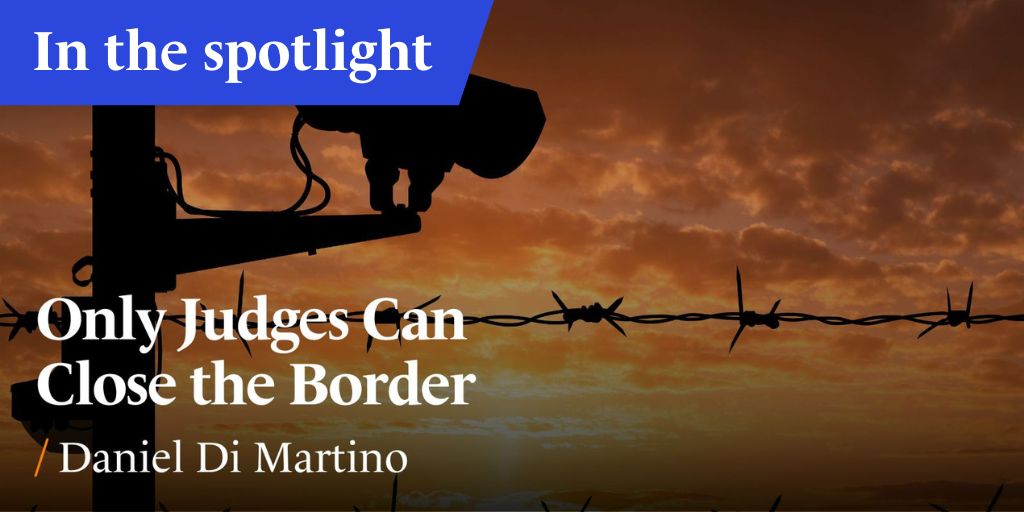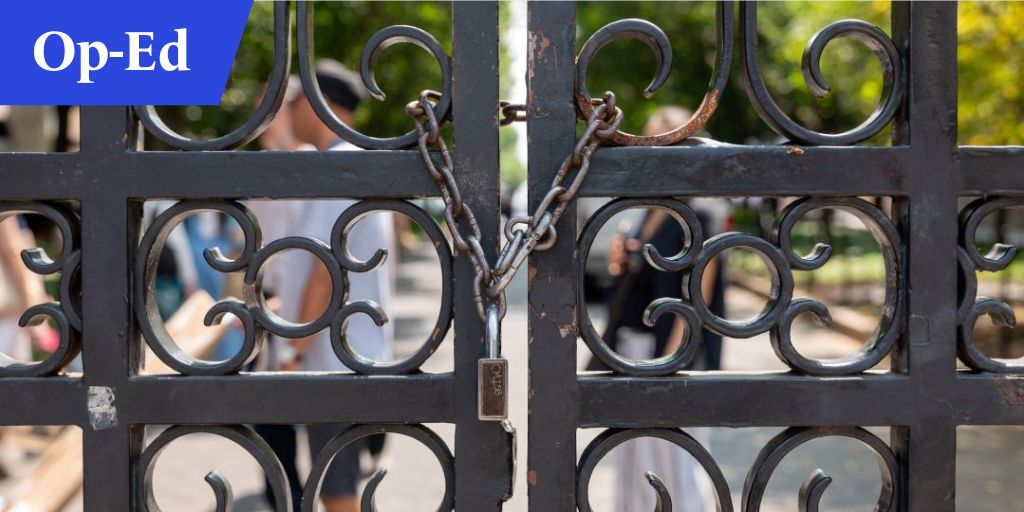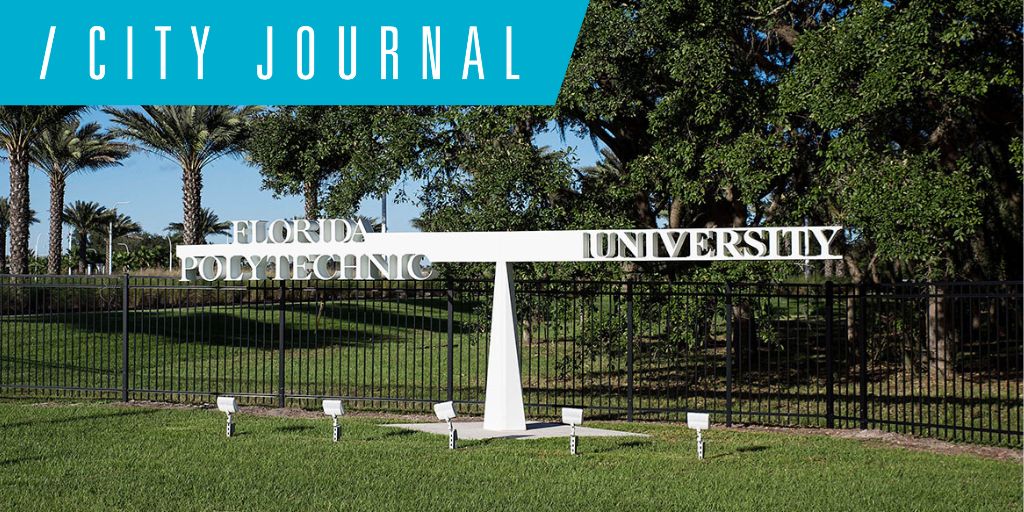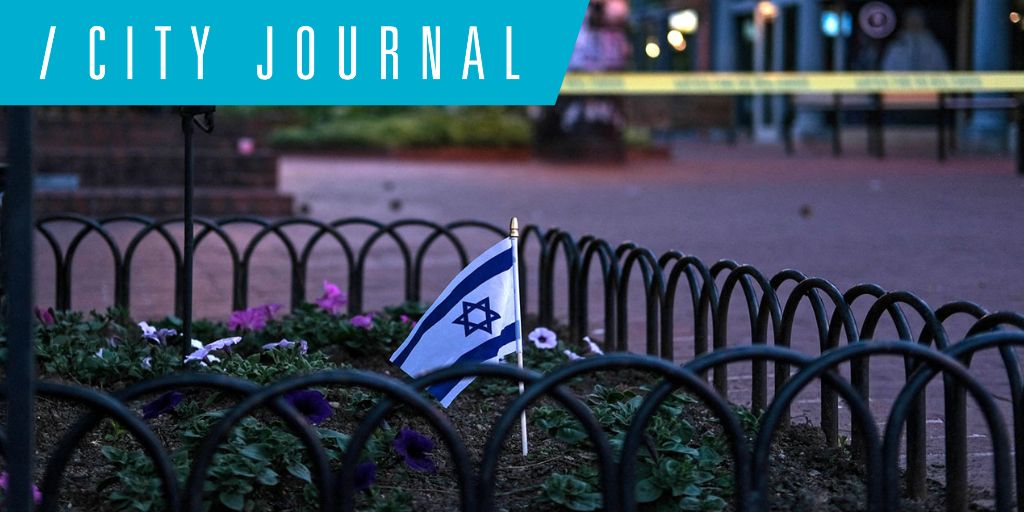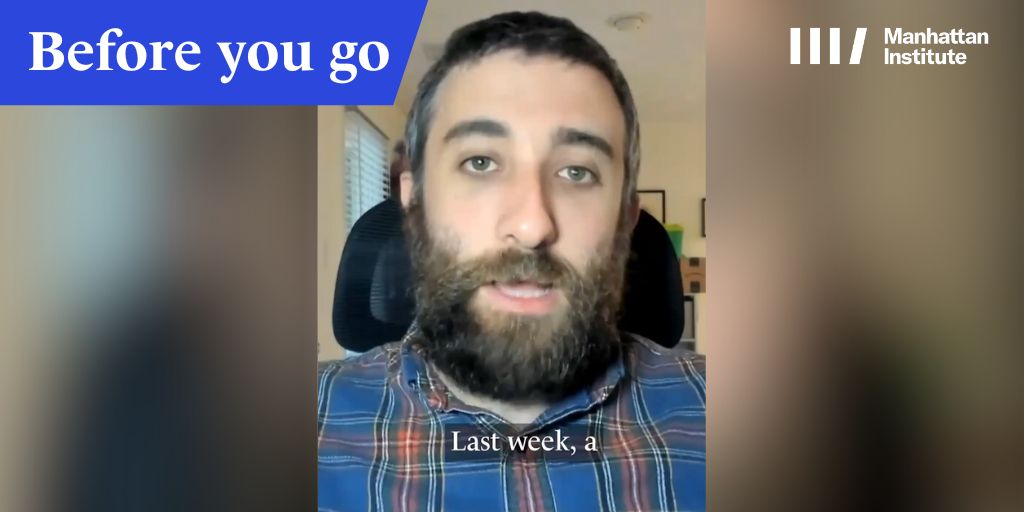Good morning:
The month of June opened with a targeted attack on a group of Boulder, Colorado, residents marching for the release of Hamas’s remaining hostages in Gaza. The suspect allegedly used what police called a “makeshift flamethrower” against the crowd and is on video shouting “end Zionists” and “Palestine is free.”
In a new video for the Manhattan Institute, fellow Charles Fain Lehman lays out the three steps absolutely necessary to combat the growing threat of anti-Semitism in the United States. There are appropriate political and criminal justice responses to such rhetoric that do not threaten free speech rights. Lehman argues for to the fullest extent of the law. Failing to do so put all of us at risk, not just American Jews.
This is because the American anti-Israel movement, Lehman writes in a separate column for City Journal, has radicalized. The Boulder “assault is the third high-profile anti-Israel and anti-Semitic terror attack in the U.S. in recent months” and it doesn’t take a political scientist to see a connection between the rhetoric of many anti-Israel protesters—“There is only one solution;” “Intifada! Revolution!” “From the River to the Sea”—to the acts of violence and terrorism.
Amid ongoing protests and campus unrest, Columbia University is trying to isolate itself from its neighbors. Although the university has always been an almost seamless part of New York City, it is closing off tree-lined pedestrian thoroughfares to everyone without a Columbia ID or pass. In the New York Times, senior fellow Nicole Gelinas calls the move an anti-urban message to students that outsiders are dangerous, which keeps the city and the students from thriving.
Increasingly, however, those barriers to entry seem irrelevant. Elite northern schools are struggling to compete with southern schools, especially with colleges and universities in Florida. In City Journal, MI’s director of constitutional studies, Ilya Shapiro, writes that the success of Florida schools in student recruitment signals a paradigm shift in higher education. Elite private universities are no longer the standard bearers for higher education.
Nor should secular schools be the default image of charter schools, senior fellow Nicole Stelle Garnett writes in National Review. The recent deadlocked Supreme Court decision on the case concerning what would have been the nation’s first religious charter school is disappointing. But the momentum is on the side of the charter school movement, and there are several steps states can take to end religious discrimination in public programs, including school programs.
Finally, this week MI released a new issue brief by fellow Daniel DiMartino on the immigration crisis in the United States. He finds that federal law enforcement is necessary but not sufficient for closing the border. If President Trump wants to make good on his promise to increase deportations and bring stability and common sense to the border, the administration must hire more judges to work through the backlog of asylum cases. Judges can close the border—if they are properly resourced.
Continue reading for all these insights and more. Kelsey Bloom Editorial Director |
|
|
Only Judges Can Close the Border By Daniel Di Martino | Manhattan Institute
Border enforcement isn’t just about walls and border patrol agents—it’s about judges. In a new Manhattan Institute issue brief, Daniel Di Martino explains why the Trump administration’s promise of mass deportations will be impossible unless the immigration court backlog is fixed.
Illegal immigrants typically can’t be deported until a judge issues a removal order. But the courts that issue those orders have long been understaffed. About 4 million cases are now pending—leaving most illegal immigrants in the country for years before seeing a judge. The result: a massive incentive to cross illegally, claim asylum, and remain indefinitely. Even many criminal aliens remain free for years. Di Martino argues that any serious mass-deportation effort will require a vast expansion of immigration court capacity. He estimates that: - Hiring 250 new judges annually would clear the backlog by 2029, at a cost of roughly $1 billion per year.
-
A smaller expansion (100 judges per year) would cost $375 million annually but leave nearly 2 million cases unresolved by the end of Trump’s term.
The key takeaway: without more immigration judges, the administration will not be able to carry out its immigration agenda. |
|
|
The Way Forward for Religious Charter Schools After St. Isidore
By Nicole Stelle Garnett | National Review Online
“How might states go about ending religious discrimination in public programs, including charter school programs? One promising model is an executive order recently issued by Oklahoma Governor Kevin Stitt. It directs all state agencies to cease enforcing state laws and regulations that discriminate against religious organizations or conduct and to conduct comprehensive audits of their programs and contracts to identify hidden religious discrimination and report their findings back to him.
“Additionally, charter school authorizers can signal that they will stop automatically rejecting applications for religious charter schools and are open to requests from existing charter schools that would like to begin teaching religion.” |
|
|
Why Should Columbia Keep Out Its Neighbors?
By Nicole Gelinas | The New York Times “Columbia has created a six-block barrier making it more difficult for ... neighbors to reach the subway and stores. ...
“That cities and campuses can be disorderly is a fact of urban and college life. The answer to that disorder is not for Columbia to transform itself into a sterile enclave, turning its back on the messy neighborhood that provides students, professors and staff with a richly varied life veined with restaurants and parkland, but to work with the city with which it is intertwined, in good times and bad alike.” |
|
|
Manhattan Institute Heads to Sun Valley, Idaho
In collaboration with the Sun Valley Policy Forum (SVPF), several luminaries from the Manhattan Institute will speak at this year’s SVPF Summer Institute, on July 1st and 2nd. This two-day conference retreat will be held in the premier mountain town of Sun Valley, Idaho. Reihan Salam, Manhattan Institute President, Heather Mac Donald, Thomas W. Smith Fellow and Contributing Editor of City Journal, and Senior Fellows Jason Riley and Abigail Shrier, will be featured in the programming, along with other notable thought leaders.
As a benefit to MI Weekly readers, Reserve ticket bundle registrations will be upgraded to the Bronze pass level, which includes access to a private cocktail party. For more information on the program go here, to register with MI benefits go here.
| |
|
Higher Education’s Future Is Covered in Palm Trees, Not Ivy
By Ilya Shapiro | City Journal
“While legacy universities dominate headlines, a transformation is taking place elsewhere, and it deserves more attention. Students are voting with their feet, abandoning the ‘colds and scolds’ of the Northeast for more favorable climates—both intellectual and meteorological.
“This shift has extended to both public and private schools. Today, it’s harder to get into the University of Florida as an out-of-state applicant than it was to get into most Ivy League schools 30 years ago, and institutions like Vanderbilt and Rice show that private universities need not be out of touch. ...
“This period of flux offers a chance to reset the national conversation about the purpose and promise of higher education. Prestige is no longer a proxy for quality. Taxpayers, parents, students, and employers are asking tougher questions about debt-financed degrees in low-return fields.” |
This Is What an Intifada Looks Like
By Charles Fain Lehman | City Journal
“The American radical anti-Israel movement has built the intellectual scaffolding for—and in many cases all but invited—the violence now playing out in places like Boulder. When you call for “Intifada,” you cannot feign surprise when someone takes that call literally. Whatever your legal right to speak, that is the outcome you invoked.
“Of course, the radical movement hasn’t limited itself to protest. It has employed vandalism, rioting, and the disruption of critical infrastructure. ... Radical activists see these actions as part of a continuum—different tactics serving the same strategic goal. While many draw a clear line between peaceful protest and throwing Molotov cocktails, the radical Left does not. To them, it’s all one and the same. “Once we acknowledge that the Intifada is here, the question becomes: what should be done about it?” |
|
|
The Reason Debates: Legalize All Drugs
Join us live on Tuesday, June 24, at the Howard Theatre in Washington, D.C., for a debate on the case for and against drug legalization.
The event is hosted by Reason magazine, whose panelists will argue in the affirmative. City Journal senior editor Charles Fain Lehman and MI’s Nick Ohnell Fellow, Rafael A. Mangual, will argue against drug legalization in favor of policies that actually have a positive impact on our communities.
How would legalization actually work? What are the alternatives to legalization? How have recent experiments in drug decriminalization played out? We are looking forward to this respectful-yet-substantive debate. Come out and join us. |
|
|
“Here’s the bottom line: Political violence happens because we let it. Decisive action now can solve the problem before it gets even more out of hand.” Related: |
|
|
For more information and media requests, please contact
communications@manhattan.institute.
Are you interested in supporting the Manhattan Institute’s public-interest research and journalism? As a 501(c)(3) nonprofit, donations in support of MI and its scholars’ work are fully tax-deductible as provided by law. |
|
|
Photo Credits: adamkaz/E+/Getty Images; Noah Berger/AP Photo; Anadolu/Getty Images; Wong Yu Liang/Getty Images; Catherine McQueen/Getty Images; Probal Rashid/LightRocket/Getty Images |
|
|
The Manhattan Institute works to keep America and its great cities prosperous, safe, and free. Manhattan Institute 52 Vanderbilt Ave. 3 floor New York, New York 10017
Want to change how you receive these emails?
Unsubscribe | Subscription Preferences
Copyright © 2025 Manhattan Institute, All rights reserved. |
|
|
|

